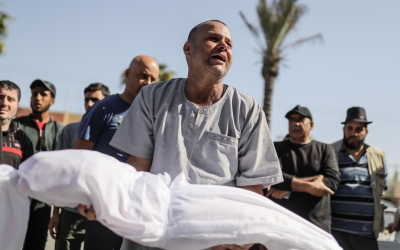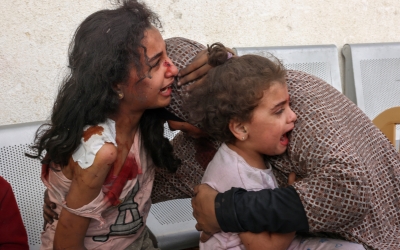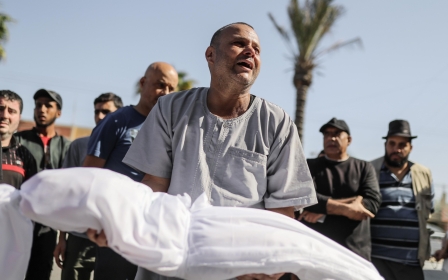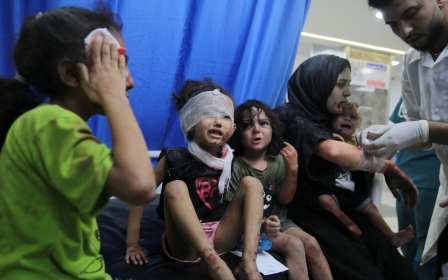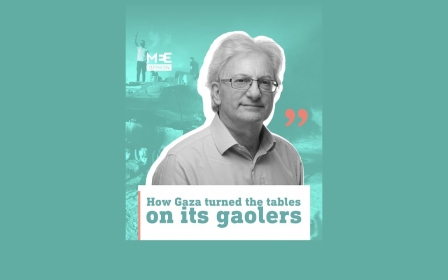Western media’s parroting of official lies is paving way to genocide in Gaza
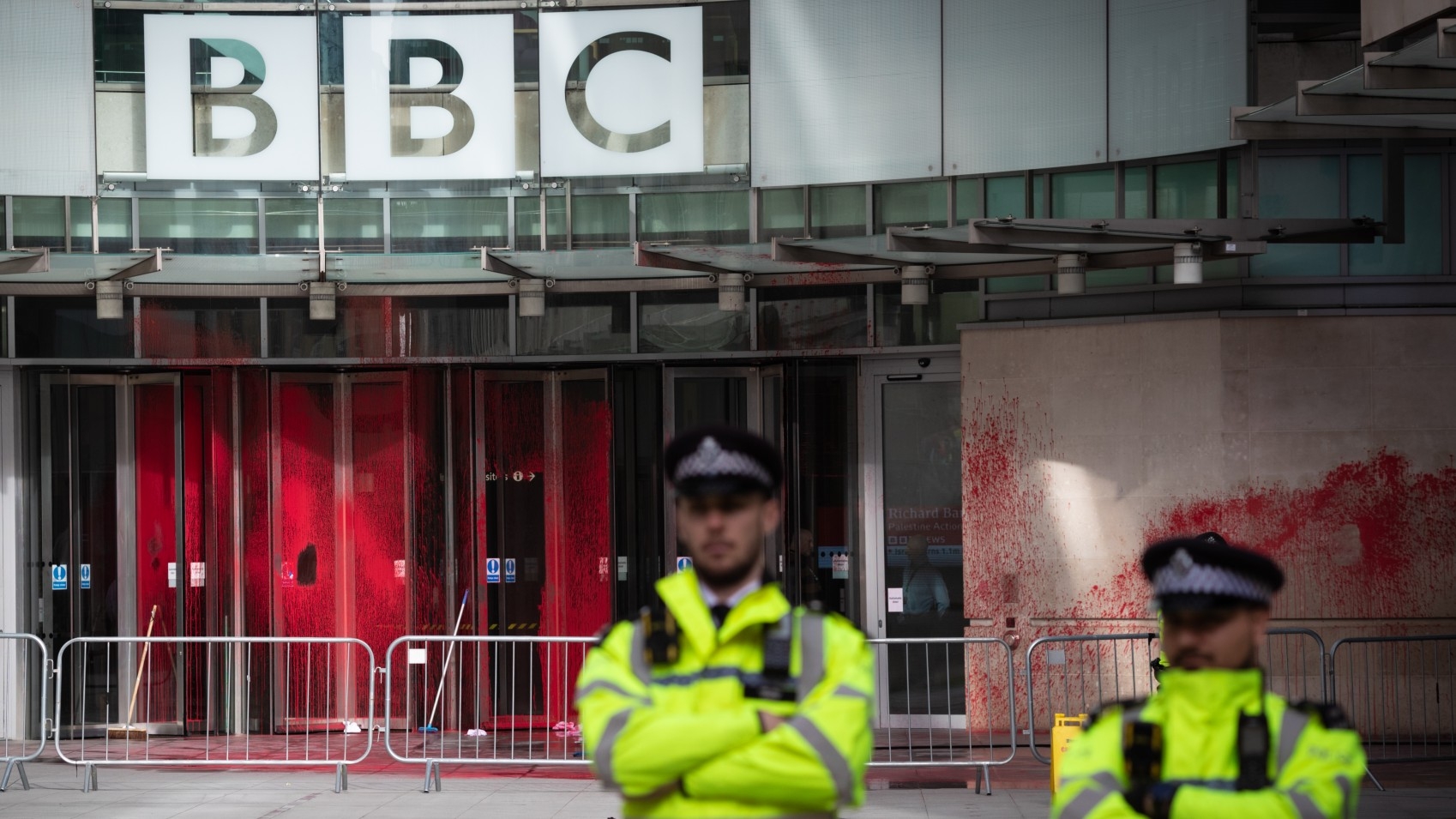
How did we get to the point where Israel can order half of Gaza’s population – more than one million people – to move from the north of their tiny prison to the south of their tiny prison, in one of the most overcrowded places on Earth? Palestinians in Gaza were given 24 hours to do so or face dire consequences.
The depopulation order is being treated as "advance warning" – a concept Israel has played around with for many years to mangle international law and legitimise its targeting of civilians.
Anyone left in northern Gaza - children, the sick, the elderly, the disabled – will face a terrifying fate: either a rain of bombs or a ground invasion comprising hundreds of thousands of Israeli troops seeking vengeance for the death of more than 1,300 Israelis during Palestinian fighters' attack last weekend.
Western leaders talk a lot about the trauma of Jews – trauma their states were often responsible for – and the resulting need not to offend Jews by being critical of Israel. France and Germany have banned demonstrations in solidarity with Gaza, and the UK is close to following suit.
None of those leaders seem concerned that the families in Gaza currently being expelled live with the trauma of having been forced from their homes at gunpoint by Israel several times before, not least during the Nakba in 1948 and during the 1967 war.
Follow our live blog for all the latest on the Israel-Palestine war
This latest expulsion order forces them to relive that trauma – as well as the terror of living under Israel’s bombs – not just in their imaginations but in the real world. They are being ethnically cleansed once more by their serial tormentor.
That is not hyperbole.
They have every reason to fear that this is not some temporary "relocation", even assuming they can reach the "evacuation" zone and that the zone actually turns out to be safe.
This risks turning into another Nakba, except the footage this time is in high definition and colour.
For years, Israeli leaders have secretly worked with western allies to pressure Egypt to refashion the Sinai desert, next to Gaza, as a sham Palestinian state. Those machinations are one of the reasons Cairo has kept its short land border with Gaza so tightly closed.
Now 2.3 million Palestinians will be pressed up against that border, clamouring for an exit from the killing fields.
Greenlighting genocide
The path to how we got here was paved by western politicians and the establishment media. They have been giving the green light to Israel to do as it pleases.
Keir Starmer, the Labour opposition leader and Britain’s likely next prime minister, forged the bipartisan political consensus in the UK last week by telling interviewers he supported Israel’s "right to defend itself" by implementing a "complete siege".
The people of Gaza are being deprived of food, water and power, premised on the idea – articulated by Israel’s defence minister Yoav Gallant – that they are "human animals".
In other words, Starmer gave Labour’s backing to genocidal-style war crimes by Israel.
On Friday, Grant Shapps, secretary of state for defence, went even further, if that is possible, by giving every appearance that he supports Israel’s right to ethnically cleanse Palestinians from northern Gaza.
The legal adviser for Human Rights Watch, Clive Baldwin, observed that the depopulation order was being made when "the roads are rubble, fuel is scarce, and the main hospital is in the evacuation zone". He added: "World leaders should speak up now before it is too late."
But part of the reason world leaders have been under no pressure to "speak up" is because the establishment media have made no effort to hold their feet to the fire, even as Israel tramples all over international law, making a mockery of it.
In fact, when a Channel 4 TV crew chased Jeremy Corbyn in the street to ask him to "condemn" Hamas, the firm insinuation was that the former Labour leader was once again being outed as antisemitic – for reminding viewers that the rights of all civilians, including Palestinians in Gaza, should be protected.
Disinformation campaigns
The British media have at least pushed back a little as politicians have supported Israel’s demands to depopulate half of Gaza. But this change of heart has been very late in coming.
The credulousness of the media has been especially flagrant in relation to claims that Hamas beheaded 40 babies in last weekend’s attack. Extraordinary claims require extraordinary evidence – but not, it seems, for media outlets when it comes to vilifying the Palestinian people.
Fabrications typically focus on particularly inflammatory issues to rile up popular sentiment in favour of atrocities against the enemy
The claim of beheaded babies made the front pages of several UK papers, even though the source was discredited the moment it came under scrutiny.
Journalists who had attended the tour of the small community near Gaza where the babies’ bodies were supposedly found quickly walked back the claim, saying they had seen no beheaded corpses.
The best they could do was point to soldiers there making the claim. When pressed for evidence, the Israeli military fell unusually silent.
US President Joe Biden breathed further life into the story by claiming he had been shown the photos, only for the White House to quickly concede that the president had not seen any such photos and was relying on information, or possibly disinformation, from the office of Israeli Prime Minister Benjamin Netanyahu.
But anyone who assumes this was a genuine mistake needs to be reminded of a few basics of journalism.
Disinformation campaigns are one of the chief battlefields in any war - something any serious journalist is only too aware of. And western powers and their allies have an appalling track record of lying to their own medias, even if we ignore the most infamous of those deceptions. The lie that Saddam Hussein was hiding weapons of mass destruction was used to justify the 2003 invasion of Iraq.
Fabrications typically focus on particularly inflammatory issues to rile up popular sentiment in favour of atrocities against the enemy. Favourites include stories of babies and women being abused.
Kuwait, a close ally of the US, propagated the entirely false story in 1990 that invading Iraqi troops had ripped babies from hospital incubators and left them to die. That helped pave the way for the US to launch the 1991 Gulf war against Iraq, the 2003 invasion’s prequel.
And in 2011 western officials claimed that Libyan troops fuelled on Viagra were preparing to carry out mass rapes in the opposition-held city of Benghazi. That lie was later exposed by a British parliamentary enquiry, but had served its purpose by then: the West had successfully overthrown Libya’s troublesome ruler, Muammar Gaddafi.
Notably, the western press spread further unsubstantiated allegations against Hamas. It claimed that some of the partygoers had been raped – before once again being forced to walk back the claim.
'Worse than Isis'
A clue to the extent to which the media has been colluding in the manipulation of public sentiment was demonstrated by The Times’ front page on Friday.
Under the splash headline “Israel shows mutilated babies” – itself misleading: Israel had done no such thing – was a photograph of bloodied small children. But those children were not Israeli. They were Palestinian children, covered in rubble dust and blood from Israel’s bombing of Gaza.
The juxtaposition was the ultimate cynical trickery: using images of wounded Palestinian children to add to the clamour for Israeli revenge – violence that would only create more wounded and dead Palestinian children.
The Telegraph joined the fray too, publishing a blurred image provided by Netanyahu’s office, seemingly of a dead baby. There was no visible indication the baby had been beheaded.
It hasn’t ended there – and was never intended to. Having spread the evidence-free claim that Hamas beheaded babies, the Israeli government is now using the claim as the basis for making a preposterous, self-serving comparison: that Hamas is the same as Islamic State group (IS), the head-chopping death cult spawned by the US invasion of Iraq.
Once again, the western media – ever gullible in the service of western powers – has allowed itself to be played.
That was only too evident during a meeting with Netanyahu when US Defence Secretary Lloyd Austin got away with declaring that Hamas’ actions were "worse than what I saw with ISIS".
If Hamas and IS both cut off heads – and Hamas is worse because it decapitates babies – then don’t they need to be treated in the same way? Or so the official logic implies.
If the false impression can be created in the minds of western publics that Hamas and IS are comparable, then Israel and its allies will find it much easier to justify even grosser violations of international law in Gaza than are already taking place.
A distorted picture
But it is not just these more extreme instances of media-regurgitated deceptions that are rationalising Israeli violence to western publics. A deeper problem lies in the media’s framing of events, presenting to audiences a woefully distorted picture of what is going on.
In the supposed interests of neutrality, the BBC publicly eschews referring to Hamas directly as a terrorist organisation. But like a nervous tic, the corporation repeats at every opportunity western governments’ designation of it as a terror group.
The BBC’s Lyse Doucet recently described the people of Gaza as facing a 'dire humanitarian crisis' – as though they had just suffered an earthquake
No media organisation would ever refer to the Israeli government in equivalent terms: noting with every mention that Israel is designated by human rights organisations as an apartheid state and a serial violator of international law.
How is one qualification pertinent but not the other? Unless the aim is not balanced reporting, as professed, but the dissemination of state propaganda.
Similarly, when liberal media report on the catastrophe unfolding in Gaza, potentially another Nakba, they invariably frame it exclusively in the language of humanitarianism. Typifying this approach, the BBC’s Lyse Doucet recently described the people of Gaza as facing a “dire humanitarian crisis” – as though they had just suffered an earthquake.
Israel's 16-year blockade of Palestinians by land, sea and air, starving them and keeping them caged with snipers at their prison fence, is presented as some unfortunate act of god.
In another glaring misrepresentation of the reality faced by Palestinians – all the more striking because it contrasts so starkly with the BBC’s sensitivity to Israelis’ suffering – presenter Clive Myrie described the mood of people in Gaza on Friday night as "anxious".
This was as more than one million of them were being forced to leave their homes, pick their way through rubble to get south, as bombs rained down unpredictably, without food or electricity and no obvious destination or place to shelter safely.
The idea that these people were "anxious" – a feeling I had just from watching the pictures from Gaza – would have been laughable had it not been so profoundly offensive.
Some die, some are killed
BBC journalists, after years of being exposed to criticism each time they use such prejudicial language in covering Israel’s latest rampage through Gaza, still demonstrate they have learnt nothing. Their careers depend on them learning nothing.
BBC World News’ website referred once again to Palestinians passively “dying” in Gaza, and compared them to Israelis who were being actively “killed”.
The role of that propaganda is to subtly, and sometimes not so subtly, equate Israel with western values and Palestinians with a barbaric primitivism
Journalists still ludicrously refer to any act of Palestinian resistance as ending a “period of quiet” – a quiet enjoyed only by Israel.
Palestinians fighting against their occupation, and the blockade that has made them prisoners in an overcrowded tiny strip of land, are implicitly guilty of "escalating tensions". Apparently tensions only build when Israelis are suffering, not when Palestinians suffer. Why? Because Palestinians are always suffering. Their pain is the quiet.
Similarly, the exculpatory word “retaliation” is still reserved for violence from Israel – it is something only the occupier can seek.
Can one seriously imagine the BBC describing Hamas’ bloody storming of a rave next to Gaza last weekend, killing hundreds of partygoers, as retaliation for years of blockade of Gaza by Israel, or for the thousands of Gaza protesters left amputees by Israeli snipers shooting them in the leg, or for the children denied a future in an open-air prison Israel patrols by land, air and sea?
Of course not.
No one at the BBC, however, has second thoughts about describing as “retaliation” the daily massacre of hundreds of Palestinians, including children blasted to pieces by Israeli missiles raining down from the sky.
The only question for these journalists is whether it would be more “proportionate” to kill a slightly lower number each day – until, that is, “quiet” can be restored.
The 'condemnation' trap
The challenges for Palestinian spokespeople to make their voices heard is all too obvious on the rare occasions they are given a platform in the West – usually only when Hamas makes headlines through violent resistance.
Last week journalists began every interview with Husam Zomlot, the Palestinian ambassador to the UK, insisting that he “condemn” Hamas. The barely veiled subtext was that any refusal to do so indicated approval of the violence.
Zomlot understands the discursive trap only too well, which is why he refuses to be drawn. It is designed to sidetrack him from giving voice to Palestinian suffering. It requires him to frame issues according to the western media’s script, ignoring the context of decades of much greater Israeli violence that helped to create Hamas.
In an interview dominated by the need to “condemn” Hamas, his five minutes of screen time will be entirely wasted. Viewers will have none of their preconceived ideas challenged or disrupted – ideas instilled in them by the flood of western propaganda they have been subjected to since childhood.
The role of that propaganda is to subtly, and sometimes not so subtly, equate Israel with western values and Palestinians with a barbaric primitivism.
No one at the BBC would ever conceive of demanding from Israel’s ambassador to the UK that he condemn Netanyahu for approving either the indiscriminate bombing of Gaza, where half the population are children, or the ethnic cleansing of northern Gaza.
And yet the Israeli ambassador represents the government doing those things. Zomlot represents the Fatah-led Palestinian Authority, which opposes Hamas.
Invented quotes
Because Zomlot refuses to step into the trap the BBC and other media lay for him, journalists appear quite happy writing a script for him: putting words into his mouth he has never said – but which they wish he would say to make their propaganda role easier.
Kay Burley did this twice on Sky News last week. She asserted that Zomlot had said of the massacre of Israeli civilians: “Basically the Israelis had it coming.” That “basically” was doing an extraordinary amount of heavy lifting in Burley’s precis of Zomlot’s interviews. It is a sentiment anyone familiar with his statements knows he would never utter.
What Burley meant is that Zomlot had refused to frame his comments in a way that suited journalists like herself who wish to peddle a simplistic, divisive and dangerous narrative – of Israel as central to western civilisation, and Palestinians as the barbarians at the gate. So she unilaterally decided to make up a quote.
If the journalistic malpractice of this is not self-evident, consider an imaginary scenario in which Burley had made up a quote and ascribed it to Gallant, Israel’s defence minister. As previously noted, last week he stopped all food, water and power entering the Gaze strip, calling the 2.3 million inhabitants there “human animals”.
Can we imagine Burley asserting that Gallant “said basically that Israel was going to commit genocide against the population of Gaza?"
In fact, that would be a far fairer summary of Gallant’s sentiment than of Burley’s invented quote from Zomlot. But it is inconceivable she would ever dare misrepresent an Israeli official’s words, or that the rest of the media would treat it as entirely unremarkable, or that she would still have her job afterwards.
Colonial blinkers
The problem here is not so much the ignorance of journalists as it is their inability to remove the colonial blinkers they were raised with, from their mostly privileged upbringings and private schooling.
They are ill-equipped to think from the point of view of the occupied, of the oppressed – and if by some miracle, they did manage it, they would not survive long in Britain’s state broadcaster, or in the billionaire-owned, advertising-driven press.
The imperative for these journalists is to uphold the pretence that we, the West, are the "good guys" and that those who refuse to submit to the enforcement of our privileges and their own subjugation must, by definition, be the "bad guys".
That paradigm is not just wrong. It is dangerous. It shores up ignorance among western publics, ignorance that western leaders then exploit to give Israel unquestioning backing as it commits atrocities against the Palestinian people.
Western publics may be largely in the dark about what is really happening in Gaza, but Israel’s neighbours are not.
Their media have been depicting the full horror. That not only incenses Arab publics, but puts pressure on their leaders to be seen to be doing something to help and protect the Palestinian people.
The West is sending warships to the region to let Israel carry out its crimes undisturbed, as well as supplying Israel with the weapons it needs to commit those crimes.
A countervailing pressure will build in the region for actors like Hezbollah to respond.
Catastrophe looms in many different arenas. And it is made all the more likely because western media have consistently failed to hold both Israel and their own governments to account – not just now, but for decades.
The views expressed in this article belong to the authors and do not necessarily reflect the editorial policy of Middle East Eye.
Middle East Eye propose une couverture et une analyse indépendantes et incomparables du Moyen-Orient, de l’Afrique du Nord et d’autres régions du monde. Pour en savoir plus sur la reprise de ce contenu et les frais qui s’appliquent, veuillez remplir ce formulaire [en anglais]. Pour en savoir plus sur MEE, cliquez ici [en anglais].




